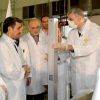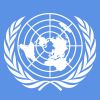WASHINGTON - While Iran's secret nuclear program has raised serious questions about that country's intentions, a military attack on Iranian nuclear facilities would not be justified under Catholic teaching in the eyes of the U.S. bishops and other Catholic leaders.
Further, any attack on Iran by Israel or the U.S. would greatly destabilize an already volatile Middle East, setting the stage for retaliatory military strikes that would place innocent civilians at risk and serve little more than to lead to an expanded arms race in the region, several Catholic observers told Catholic News Service.
The concern lies in what is seen as a preventive attack meant to stop Iran from furthering its nuclear program, which Iranian officials claim is for peaceful purposes.
Such a preventive attack -- as opposed to a pre-emptive strike meant to head off an imminent attack under just-war principles -- also poses moral questions because Iran's research is legal under international agreements and to date falls within the limits set by the Non-Proliferation Treaty regarding the development of nuclear weapons, the Catholic observers said.
"The problem with preventive war is that it lowers the barrier to war too low," explained Stephen Colecchi, director of the bishops' Office of International Justice and Peace.
"Using military action for a vague and gathering threat is very different than using military force in the face of an immediate threat," he said.
In February, reports surfaced that Israel was nearing a military attack on Iran in an effort to knock out some of Iran's key research and military facilities. While the rhetoric has quieted in recent weeks, reports continue to surface that the government of Israeli Prime Minister Benjamin Netanyahu considers an attack necessary.
President Barack Obama reportedly has worked to deter any such strike in the hope that economic sanctions and world pressure might force Iran to scale back its nuclear program, become more transparent about its intentions and allow wider access to International Atomic Energy Agency inspectors.
Acknowledging the tensions in a March 2 letter to Secretary of State Hillary Clinton on behalf of the bishops, Bishop Richard E. Pates of Des Moines, Iowa, cautioned against any military action.
"Discussing or promoting military options at this time is unwise and may be counterproductive," wrote Bishop Pates, who chairs the bishops' Committee on International Justice and Peace. "Actual or threatened military strikes are likely to strengthen the regime in power in Iran and would further marginalize those in Iran who want to abide by international norms."
What observers such as Gerard Powers of the University of Notre Dame, theologian Franciscan Father Kenneth Himes and longtime peace advocate Marie Dennis propose is a measured approach that relies on diplomacy on the road to a solution.
They point to the 2003 preventive attack on Iraq by the U.S. and its allies based on what today is widely considered erroneous information that Iraqi dictator Saddam Hussein had harbored an arsenal of weapons of mass destruction. No weapons were ever found in Iraq and the end result is that after more than eight years of occupation the country remains highly unstable with various religious and political factions maneuvering for power and control.
"If you go down that road it blurs that fundamental distinction between legitimate defense and aggression," said Powers, director of policy of studies at Notre Dame's Joan B. Kroc Institute for International Peace Studies. "It would make a turbulent and unstable Middle East even more so.
"It would be inconsistent with moral certainty that is required before you use military force because it is often speculative about what might happen in the future. In the end it is an endorsement of a notion that might makes right," Powers said.
Father Himes, associate professor of theological ethics at Boston College, agreed with the U.S. bishops' that any attack on Iran under current circumstances constitutes a lowering of the threshold for war.
"Given the state of the devastation of war, we should be raising the bar for going to war," he told CNS.
He also sees Iran possibly acting through its proxies -- Hamas in the Gaza Strip and Hezbollah in Lebanon -- in mounting attacks on civilian targets in southern and northern Israel, respectively.
Father Himes said he would welcome direct negotiations between American and Iranian delegations. Doing so would give Iran a level of respect it seeks in the international community, he said.
Despite the secrecy surrounding Iran's nuclear program, Dennis, co-president of Pax Christi International, said she is concerned that any attack will hasten the expansion of an arms race in the region. Some countries likely seek nuclear weapons contrary to the Non-Proliferation Treaty.
She called for the U.S. lead the effort to make the Middle East a nuclear weapons-free zone.
"Pax Christi feels very strongly that the danger of Israel will be exacerbated by preventive war on Iran," she said. "The best way to provide for security for Israel, which it has a right to expect like Iran, is by eliminating the possession of nuclear weapons so that we ratchet down this kind of threat and that we work for greater regional and global understanding."
The church also can play a role to reducing the threat in the region.
"We can -- the U.S. church and Catholic churches in other nuclear weapons possessing states -- take the lead and be really serious about the consequences of continuing reliance on nuclear weapons," Dennis said. "We've never moved as a church to a place where we as a pastoral imperative challenged the engagement of Catholic people in nuclear weapons production and the strategies of using nuclear weapons.
"We could help move with other Christian and other religious traditions to be clearer about what does it mean in terms of moral decision-making for individuals, for companies and for our government if having nuclear weapons is considered a grave sin," she said.
With the oscars this weekend, everyone's mind is on the movies.
And if you're thinking of heading to see some of this week's new releases then check out our reviews below.
Arms treaty need to protect poor, Vatican's UN observer says
VATICAN CITY - The unregulated sale and transfer of weapons and weapons' technology harm the poor and threaten peace and security around the world, a Vatican official told a U.N. meeting.
Archbishop Francis A. Chullikatt, the Holy See's permanent observer to the United Nations, addressed a committee preparing for the U.N. Conference on the Arms Trade Treaty; the conference will be in July.




